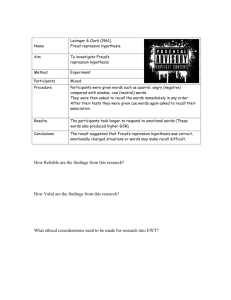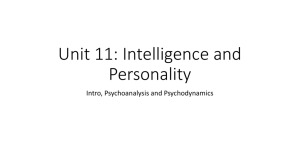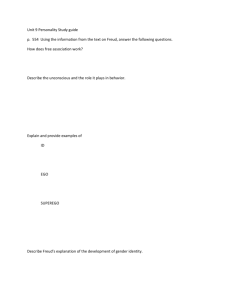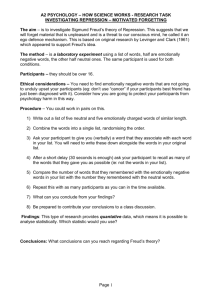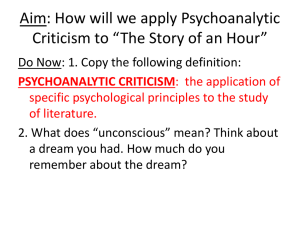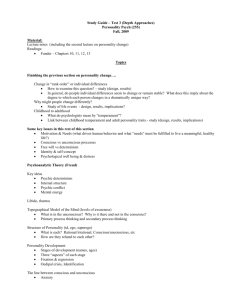Resistance
advertisement
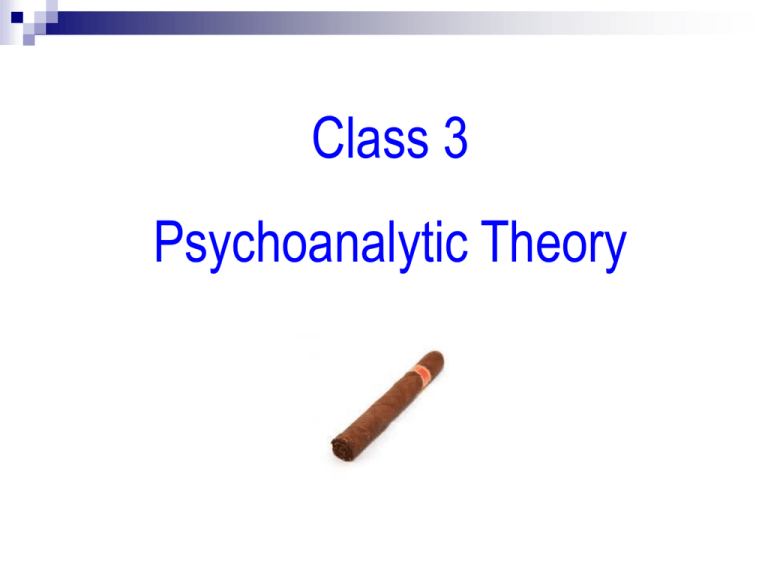
Class 3 Psychoanalytic Theory Freud and His Background Born 1856 in Moravia, currently Czech Republic Jewish roots a. Anti-Semitism as spur to P-A b. P-A emphasis on symbols, hidden meanings, text c. Role of ego as “Fiddler on the Roof” btwn ID, Superego Trained as a neurologist Association with Josef Breuer – hypnosis and hysteria Freud and Sex Sex and sexual urges are central to P-A Reasons: a. Freud’s self-analysis b. Era in which Freud lived was sexually repressed Ms. Steinway, have you no shame! How Does Psychoanalysis Relate to Social Psychology? 1. Levels of consciousness 2. Overt social behavior driven by unconscious drives, motives, emotions, memories 3. Importance of language, and especially self-to-self language 4. Importance of inner life 5. Struggle to coordinate private needs with social, societal demands 6. Connection between psychological life and physical health 7. Effort to achieve integrated self: self at peace with itself “Genetic” System of Psycho-sexual Development a. Oral phase (Birth - 1 Yr): self vs. non-self b. Anal phase (1-3 yrs): control vs. release c. Phallic phase (3-4 yrs): explore vs. inhibit, Oedipus/Electra complexes. d. Latency phase (5 to puberty):consolidation of phases a – c e. Genital phase: accommodation vs. fear/hostility Each stage presents "conflict". Failure, or over-success, at stage leads fixation on it. Personality shaped by these stages. Additional Features of Freud’s Theory Structural System of Psyche Analogues to Psychic Triad? a. Id – pleasure principle Mob Congress Motor b. Ego – accommodator/negotiator Governor President Driver c. Superego – rule writer/moralist Priest Defenses of Ego a. Resistance b. Repression Personality = interaction of all three systems Developmental + Structural + Defenses Supreme Court GPS Lecture 1: Introduction to P-A Opens with warning to audience Method of P-A: Free association “Data” of P-A: a. Unobservable b. Like history c. Learned first on oneself Mind-body problem Lecture 1: Introduction to P-A, cont. Psychoanalysis is denigrated by other psychologists, society. Why? a. Promotes notion of unconscious b. Champions non-rational (aka feminine?) c. Addresses sexuality 1. Sex is central to unconscious 2. Sex is key to culture 3. Sex is motor that drives civilization Lecture 2: Psychology of Errors Freudian slip: When you say one thing but mean your mother. 1. Secrets of psyche found in language errors a. Slips of the tongue b. Mis-readings c. Forgetting, misplacing objects, damaging things 2. Deterministic – there are no coincidences, nothing random in behavior. 3. Errors represent conflicted motives a. Between private desires, public rules b. Errors are way of disclosing, venting desires. Lecture 2: Psychology of Errors, cont. 4. Hidden meaning of errors facilitated by fatigue, verbal associations, etc. -- occur when defenses are relaxed. 5. Scientific problems of P-A approach to errors a. Falsifiability b. Tautology 6. Note Freud's argument style: Voices hearer's distain, resistance, Creates counterarguments to hearer, Then challenges his own counterarguments. "Motoric" Freudian Slip: Paul Ekman's Emotional Leakage Ekman & Friesen, 1969 "Motoric" Freudian Slip: Paul Ekman's Emotional Leakage Ekman & Friesen, 1969 On-Air Freudian Slips ''For seven and a half years I've worked alongside President Reagan. We've had triumphs. Made some mistakes. We've had some sex...uh...setbacks.'' George W. Bush, 1988 More slips: http://www.youtube.com/watch?v=BEIslG2 McpA Lecture 3: Resistance and Repression 1. Free association should be easy. Is it? 2. Resistance to free association reflects repression; resistance serves repression. 3. Why repress? Defense against threatening thoughts/wishes 4. Architecture of Psyche a. Unconscious = large ante-chamber b. Narrow passage with gate-keeper c. Smaller room = consciousness/preconscious d. “Spotlight of attention" consciousness. Lecture 3: Resistance and Repression, cont. 5. Repression occurs at narrow passage, but repressed material sneaks through via back doors, in disguise. How? Neurotic symptoms Neurotic symptoms serve two functions: 1. Guide to what is repressed 2. Sustain repression 6. "Let There Be Light", John Huston http://video.google.com/videoplay?docid =7324838937417972680# Lecture 4: Anxiety 1. Statement on normal anxiety = mini thesis on emotion 2. Normal anxiety a. Response to expected harm b. Intensity = nature of threat + ability to handle threat. c. Functions: 1. Draw attention to threat 2. Readies body for action 3. Where do all emotions come from? a. Memories of past events b. Anxiety first learned at birth trauma Neurotic Anxiety Free-floating anxiety: a. Appears to have no cause, but must have a cause b. Cause is hidden 1. Freud: hidden cause is forbidden, e.g., sex. urges 2. Modern POV: Cause is any dangerous meaning c. Anxiety arises when encountering cue related to forbidden /threatening meaning or inclination. Neurotic Anxiety, cont. Free-floating anxiety: d. Neurotic symptoms: 1. Serve as escape hatch by which impulse is expressed. 2. Serve as cue to nature or impulse e. “Sublimation” is motor of civilization.
